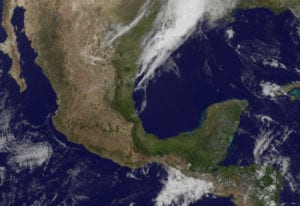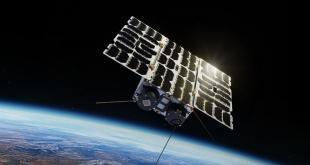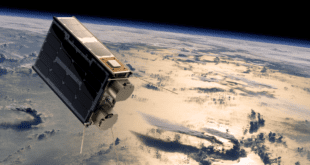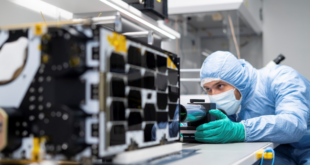
Nanosatellite manufacturer and mission integrator NanoAvionics, together with the Mexican Space Agency (AEM) and students from the Polytechnic University of Atlacomulco will develop the first nanosatellite for the State of Mexico, (one of most important states of the country), the AtlaCom-1. Building the nanosatellite is part of a pilot project to establish a nanosatellite infrastructure for future space missions designed and built by Mexico’s youth.
The project, starting in September 2020, is a testimony to the importance of space applications enabled by nanosatellites, which are rapidly becoming essential to national economies. Together, the Mexican Space Agency, led by Dr. Salvador Landeros, appointed director general of AEM in 2019, and NanoAvionics are fostering the advanced skills that Mexican youth will need to bring the country’s space industry forward.
“NanoAvionics’ participation in this educational pilot project with the Mexican Space Agency further confirms its status as a global mission integrator and the company’s determination to advance STEM education,” said Brent Abbott, the CEO of NanoAvionics US Inc. “NanoAvionics is continuing its work with universities and is proud to support AEM’s STEM efforts. Benefiting from NanoAvionics’ great expertise and technology, Mexican students will gain prodigious knowledge and skills to participate in their country’s growing space economy and experience the entire development and operation cycle of a space mission.
”To make sure all members involved in building the nanosatellite are protected we’ll put the same strict guidelines, safety equipment and measures in place we are already using in our manufacturing facilities.”
NanoAvionics’ engineers will share their space mission experience and help the students and faculty at the Polytechnic University of Atlacomulco to develop the ATLA-1. The company’s multi-purpose nanosatellite buses are pre-configured and pre-qualified, allowing mission teams to focus on their payloads. As a result, technology development missions can produce results quicker and satellite constellations can enter commercial service much faster.
The project is further supported by the Mayor of Atlacomulco, Roberto Téllez-Monroy, an engineer with a passion for space technology.
“Nanosatellites and other technologies such as breakthroughs in robotics, 3D-printing and biotech mark the fourth industrial revolution and promise enormous economic benefits, not only to Mexico but the whole world,” said Téllez-Monroy. “NanoAvionics’ commitment to developing the technical skills of students in Atlacomulco will help building a solid foundation for Mexico’s emerging nanosatellite industry.”
NanoAvionics is a nano-satellite bus manufacturer and mission integrator currently based in four locations – Columbia (US), Midland (US), Vilnius (Lithuania), and Oxfordshire (UK). Its flagship multi-purpose M6P and M12P are the first pre-configured nanosatellite buses in the sector, designed to serve emerging commercial space markets. The company’s efforts are focused on enabling critical satellite functions and optimizing their launch, hardware and operation costs – ranging from single missions to constellations. Its core engineering team has implemented over 75 successful satellite missions and commercial projects during the past several years.
The Mexican Space Agency (AEM by his acronym in Spanish), is a decentralized organization of the Communications and Transports Secretary, of Federal Government of Mexico, country that recently obtain the successful deployment of the AztechSat-1, first Mexican Nano-satellite in the International Space Station.
 SpaceWatch.Global An independent perspective on space
SpaceWatch.Global An independent perspective on space




